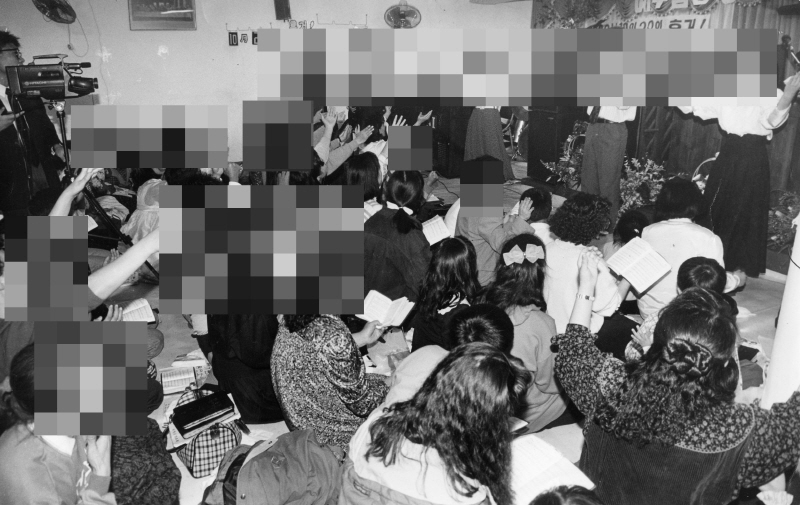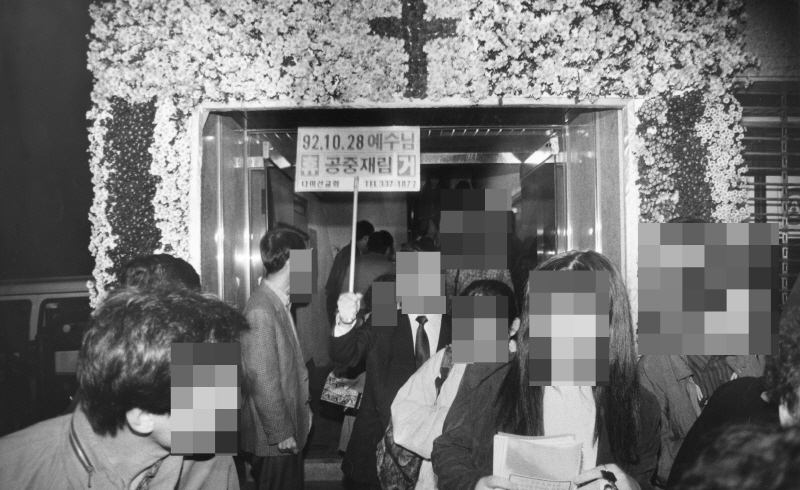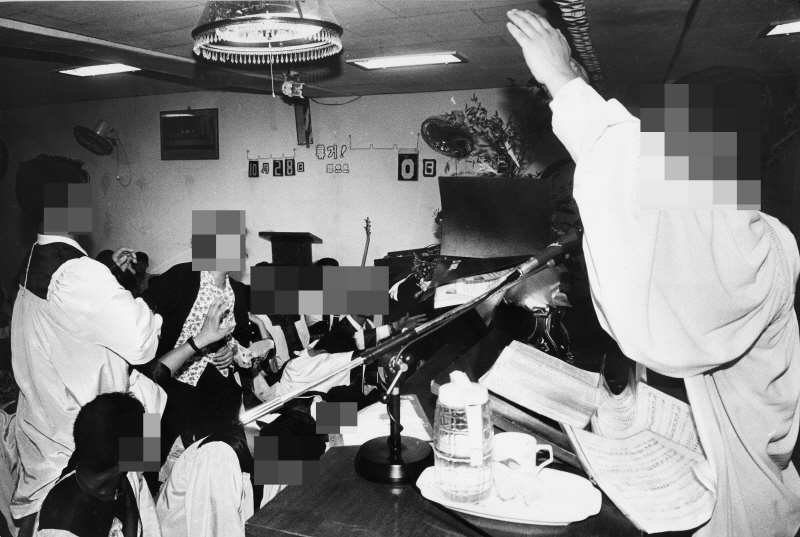[Editor’s note: Have you ever wondered why people are drawn to cults? Throughout history, forces that exploit chaotic times to consume souls have always existed. Such was the case on October 28, 1992. The “Rapture,” a doomsday prophecy, led to numerous victims. People lost their fortunes, severed ties with their families, and, in some cases, even took their own lives.
Even 33 years later, the damage caused by cults continues to unfold. This article revisits the chaos of 1992, when the turmoil of the end times reached its peak, based on the testimony of Park Sun-sook (a pseudonym), a former follower of the Rapture movement, and Reverend Jin Yong-sik, who has been at the forefront of fighting against cults.]

“For the Lord himself will come down from heaven, with a loud command, with the voice of the archangel and with the trumpet call of God… After that, we who are still alive and are left will be caught up together with them in the clouds to meet the Lord in the air.”
(Thessalonians 4:16–17)
That day, we read and reread the scripture. The time of salvation had arrived, just as God had taken Enoch into the air to spare him from death (Hebrews 11).
It was the evening of October 28, 1992—a cool autumn night in Seoul’s Mapo District, but the main hall of the Dami Mission in Seongsan-dong was sweltering from the fervor of the believers. Dressed in white from head to toe, they knelt tightly packed together, immersed in prayer and hymns.
“Their hearts are consumed only with the desire to please God,” I thought, glancing around. The scenes I had witnessed upon entering the hall earlier flashed through my mind. Crowds of reporters, both domestic and international, had gathered in front of the church. But they weren’t alone—thousands of family members of the believers had also gathered, their presence palpable. Some shouted at us, while others wept and pleaded.
“Good heavens! What kind of spell are you under? Please, stop this madness!”
“You fool! Are you throwing away your future? Don’t you care about your family?!”
Every cry carried its own story, yet I pitied them. Salvation, after all, was only for those who believed.

“Our Father in heaven…”
As the promised time drew near, the voices of praise grew louder. The more chaotic it became outside, the more fervent the prayers became inside. The believers’ speaking in tongues and hymns rose in decibels.
Terrified that insufficient prayers or a lack of faith might exclude them from the “list,” the believers poured every ounce of their energy into worship.
One man knelt, repeatedly bowing and crying out to God at the top of his lungs. Another beat his chest with his fists, sobbing uncontrollably. Quietly, I clasped my hands and recited prayers under my breath.
“Dong… dong… dong…”
The wall clock in the hall struck midnight. The feverish prayers, weeping, and singing that had filled the room felt as though they had been sucked into a vacuum, disappearing in an instant.
The sound of someone sharply inhaling broke the silence for a moment before that, too, faded into the quiet. I let all the tension leave my body and tightly shut my eyes.
“Tick, tick, tick.”
In the eerie silence, the ticking of the second hand felt like a heartbeat. How many minutes passed? I opened my eyes slightly and looked around. My body remained grounded. The sister beside me and the person in front of me stared blankly at the clock.
That night, the Rapture did not come for us.
Nostradamus and the End Times

“You love books, right? This one’s making waves lately.”
Five months earlier, my older sister, who had come to visit, handed me a book.
“She’s never been into books—what’s gotten into her?” I wondered.
The book she gave me was striking, starting with its cover. Against a pure white background, bold navy-blue letters proclaimed the title:

The author was Lee Jang-rim, and the publisher was the Dami Mission Publishing House. After my sister left, I opened the book. Two hours later, I realized I hadn’t even started preparing dinner, completely spellbound by its contents. As I neared the final pages, an overwhelming sense of dread sent chills down my spine.
“What… is this?”
The book claimed that, unlike Nostradamus’s prophecy of the world ending in 1999, the chosen believers of God would ascend to heaven in 1992, seven years earlier, escaping the destruction of humanity. This ascension was called the “Rapture.” Those left on Earth, it warned, would endure Third World War, the Armageddon conflict, and unspeakable suffering.
The book confidently assured the Rapture’s truth, seamlessly quoting foreign theologians and prophets. Somehow, everything it said felt convincing. I stared for a long time at the pamphlet tucked inside the book. Its bold words stood out: “This year is the year of the Rapture.”
“Jesus, please just take me with you”
Even now, more than 30 years later, I often wonder why I was so drawn to that book and how I came to believe the certainty in that pamphlet. Although I was a devout Protestant, I suspect it had to do with the pain that consumed my life at the time.
Growing up as one of seven siblings, I was often sick for no apparent reason. My health worsened when, at 11, I moved with my parents from the countryside to Seoul. Many days, I could barely swallow food.
At 19, I was frequently bedridden. My family was too poor to afford proper medical treatment, and during those hard times, I survived on scraps—bits of bread made from flour mixed with saccharin.
By my early 30s, after marrying and giving birth to two children, tuberculosis struck. It drained me of all strength, leaving me unable to handle daily life. Whenever I lay down, it felt like my body was sinking into the earth. All I could do was stare at the ceiling and repeat the same prayer over and over:
“Jesus, please just take me with you.”
Rebuke from the Church Pastor and Conversion
My husband, a long-time truck driver, had a kind heart and couldn’t ignore those in need. It was common for him to lend money to acquaintances in difficult situations, only to never see it returned.

Our financial struggles meant that even after having children, buying something as simple as milk was a luxury we couldn’t afford. One of my children developed acute pneumonia just two weeks after birth and was repeatedly rushed to the emergency room in the years that followed. Deep down, I constantly wished someone would come and make my life easier.
Perhaps that’s why the word “Rapture” never left my mind from that day forward. I wrote down the phone number for the Dami Mission that was listed in the book. A few days later, I researched the bus routes to their church in Seongsan-dong. About a month later, I decided to approach the pastor at the church I had been attending.
“Pastor, I want to be part of the Rapture. I’m going to join the Dami Mission.”
The pastor and ministers responded with harsh words—so harsh I could hardly believe what I was hearing. It was unlike anything I had ever seen or imagined before.
The very next day, I began my life at the Dami Mission. Many people had already gathered there, hoping to be included in the Rapture. Unmarried members with no families to care for stayed at the church full-time, both living and eating there.
‘Dami Mission: Heaven on Earth’
Since we were people who had already secured our date of salvation, there was no greed, envy, or anger among us. Everyone smiled brightly and treated each other with kindness. We all brought food to share, eating together as one.

A family spanning three generations, presumed to be followers, worshiping at an apocalyptic church in Seoul on the night of October 28, 1992. [JungAng Photo]
Even in front of the restroom, people would insist, “Please, you go first.” It felt like heaven on Earth. I was especially reassured by the fact that many of the followers were wealthy.
“It’s not just people who are struggling and want to escape pain who have come here. Even well-off people believe in the Rapture, which shows how valuable it must be.”
The bus ride from my home in Myeonmok-dong to the Dami Mission in Seongsan-dong filled me with a sense of excitement and joy I had never experienced in my life. Around that time, I began trying to persuade my husband, who didn’t believe in the Rapture, to join me. Though he was immovable at first, one comment from me made him reluctantly give in:
“Imagine if I ascend with the kids during the Rapture, leaving you behind on this Earth. Could you live with that?”
The day before the Rapture, my family packed our bags. Following the church’s instructions, we dressed entirely in white. Though we didn’t have much, I carefully wrapped a few nice clothes in plastic and left them by our front gate with a note that read: “These are clean, feel free to use them.”
At 8 p.m., holding our two children, my husband and I set out for the Dami Mission in Seongsan-dong.
And then, nothing happened
The result? As everyone now knows, the Rapture did not occur. When the clock struck midnight on October 28, the hall fell deathly silent. No one dared to speak. Completely drained, I collapsed and fell asleep right where I was.
A few hours later, we returned home. Neither my husband nor I said a word about what had happened. For the next two or three weeks, I lay in bed, almost comatose, overwhelmed by exhaustion. My husband didn’t reproach me. Our family gradually left the grand fiasco behind and resumed our everyday lives.
Of course, life wasn’t entirely smooth afterward. The scarlet letter of being a “Rapture follower” lingered for a long time. But I eventually started attending church again and found peace of mind.
Still, there’s one question I’d like to ask Pastor Lee Jang-rim someday: “Did you really believe in the Rapture?”
Pastor’s Daughter Caught Up in the Rapture
What did religious leaders of the 1990s think as they witnessed the Rapture phenomenon up close? Reverend Jin Yong-sik, chairman of the Korea Christian Heresy Counseling Association, admitted that even his own daughter, then an elementary school student, became captivated by the Rapture theory.
“If even a pastor’s daughter got caught up in it, that says it all.”
Reverend Jin, who was ministering in Jeonju at the time, recalled how his daughter came home one day asking about the Rapture. It turned out that her homeroom teacher, a Rapture follower, had been showing videos to the students every day, effectively brainwashing them. Fortunately, after the Rapture turned out to be a non-event, his daughter quickly returned to her normal life.
“That experience taught me something. If innocent children can get drawn in so easily, there’s little hope of reasoning with adults who are determined to believe.”
Since then, Reverend Jin has helped over 2,000 cult and sect members leave their groups. He also played a key role in helping Park Sun-sook, the former Dami Mission believer, reclaim her daily life.

Lee Jang-rim Didn’t Believe in the Rapture Himself
Unlike many other cults and doomsday movements in Korea, the Dami Mission and the Rapture theory were unique in that its leader, Pastor Lee Jang-rim, never claimed to be the reincarnated Jesus. Ironically, Lee wasn’t even at his church on the day of the supposed Rapture.
“A month before the Rapture date, Lee Jang-rim was already in prison.”
On September 24, 1992, Lee was arrested on fraud charges. Prosecutors confiscated 1.93 billion won in checks, 3 billion won in bonds, and $26,700 in foreign currency from him. The Dami Mission was found to have amassed 2.5 billion won in offerings.
What shocked followers most was the discovery that the bonds Lee held were repurchase agreements set to mature in 1993—long after the supposed Rapture date of October 28, 1992. Followers were left dumbfounded. Media reports from the time also noted that Lee, while in prison, had reportedly fallen asleep well before midnight on the day of the Rapture.
“I was curious about that too,” Reverend Jin admitted. “Did Lee Jang-rim truly believe in the Rapture?”
About a year after the failed Rapture, Reverend Jin met Lee and confronted him. Lee confessed, “Yes, I started spreading the idea, but the followers became so fervent, it felt like I was swept away by a wave. I didn’t realize things would escalate to this extent.”
Although Reverend Jin tried to track Lee’s whereabouts afterward, he could not ascertain his exact activities. He only learned that Lee had changed his name to Lee Dap-gae.
BY SUKMAN YOON, NAHAN KIM, YOUNGNAM KIM [kim.youngnam@koreadaily.com]






